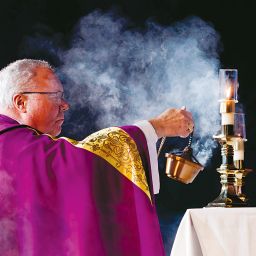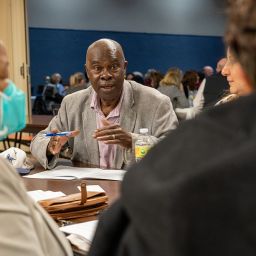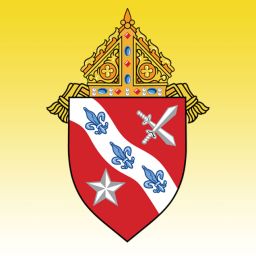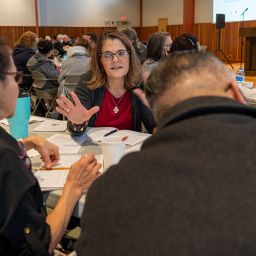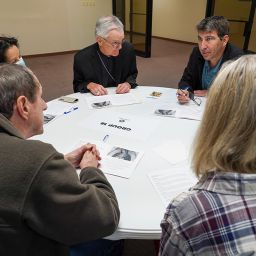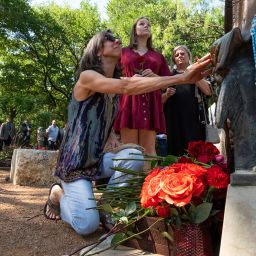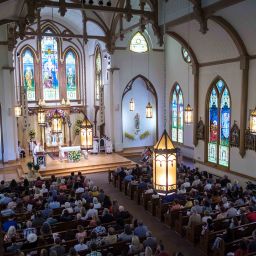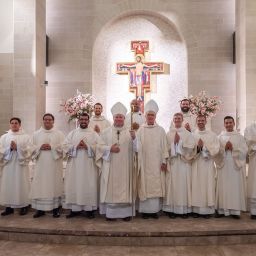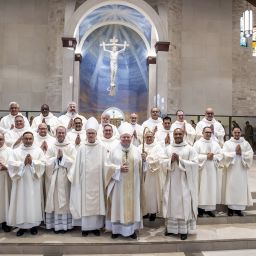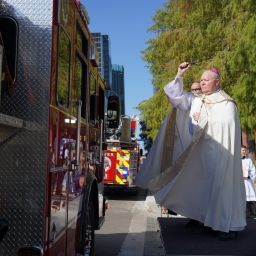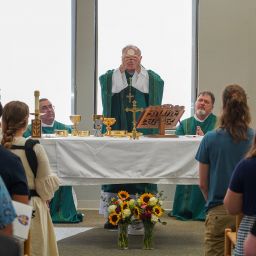
By Michael Gresham
The Texas Catholic
PLANO — The role of the laity in the Church in Dallas is vital, Bishop Edward J. Burns told participants in a Diocese of Dallas Synod listening session on Communications and Evangelization on Feb. 25 at John Paul High School.
“We cannot do what we do in the Church without the laity,” Bishop Burns said. “While this is an apostolic Church, the lay participation is key.
The bishop explained that the involvement of laity benefits the diocese in numerous, including laity volunteering their time and service on advisory boards and commissions such as the diocesan finance council, interracial healing taskforce and diocesan review board.
“There are groups of lay faithful who play a very important role in the governance of the church through their work,” Bishop Burns said. “Their service helps deal with a number of issues that play a part in our lives. The lay faithful are most instrumental in our diocese.”
Father Paul Bechter, who served as emcee for the Feb. 25 event, noted that the laity and all those involved in the synod session embody the spirit of the topic, communications and evangelization.
“We’ve been given this incredible treasure of the Good News of the Gospel and the words of eternal life, and Jesus gave us the great commission in Matthew 28, to “go forth and to make disciples of all nations,” communicating this Good News in order to teach and make disciples,” Father Bechter said. “For me, this synod session is at the heart of it all. Our diocesan synod is not about changing what we believe, but it is about learning how we can better communicate and live in accordance with those truths.”
Auxiliary Bishop Greg Kelly reiterated the vital role the faithful play through their participation in synod listening sessions, noting that the Letter to the Hebrew reminds that “since we are surrounded by so great a cloud of witnesses, let us keep our eyes fixed on Jesus, who inspires and perfects our faith.”
“Keeping an eye on Jesus and His will for us, we seek in this synodal process over the years to discern more fully what the will of God is for us now,” Bishop Kelly said. “His Holy Spirit is also working through all members of the diocese in this process. Your own experiences, your own faith, your own vision – they are all an important part of this.”
Bishop Kelly explained that in the Benedictine tradition, whenever the abbot has to make a big decision, he has to consult all the monks in the monastery because sometimes the way forward is revealed to the youngest monk.
“The abbot still has the power and the obligation to govern, but he wants to hear from everyone first,” Bishop Kelly said. “In some ways, the synodal process is the same. We want to hear from as many people in the diocese as possible to discern the way forward – how we live out our faith in Jesus Christ in this time, in this place, as His people.”
Following small-group discussions focused on 10 questions provided by the Synod Preparatory Commission, Bishop Burns took time to answer questions from participants that ranged from the role of the laity to how the Church can address those who may be falling away from the faith.
Communication and evangelization are key parts of addressing those issues, the bishop said.
“With the message of secularism and relativism in our culture and our society today, it casts a lot of doubt in young people’s minds,” Bishop Burns explained. “It is important for us to catechize well, to communicate well, and to be able to present the very truth of the essence of the Church.
“Our God loves us so much,” he added. “He wants a personal relationship with us and to claim us as His own children.”
The next public listening session, which will focus on the topic of Catholic Education, is scheduled March 25 at the University of Dallas in Irving. To learn more about the Diocese of Dallas Synod or to register for an upcoming session, visit www.cathdal.org/synod.

